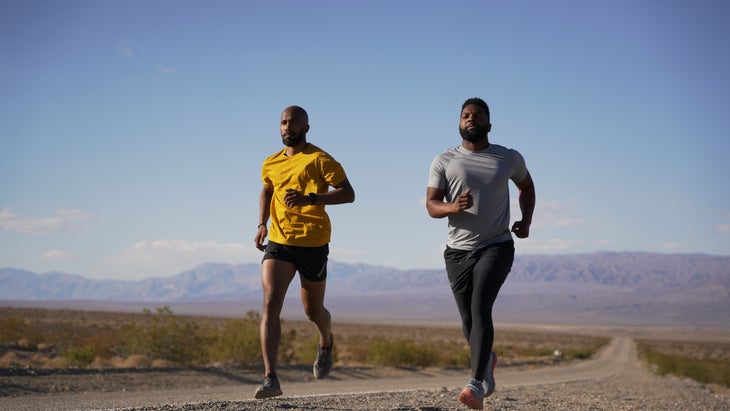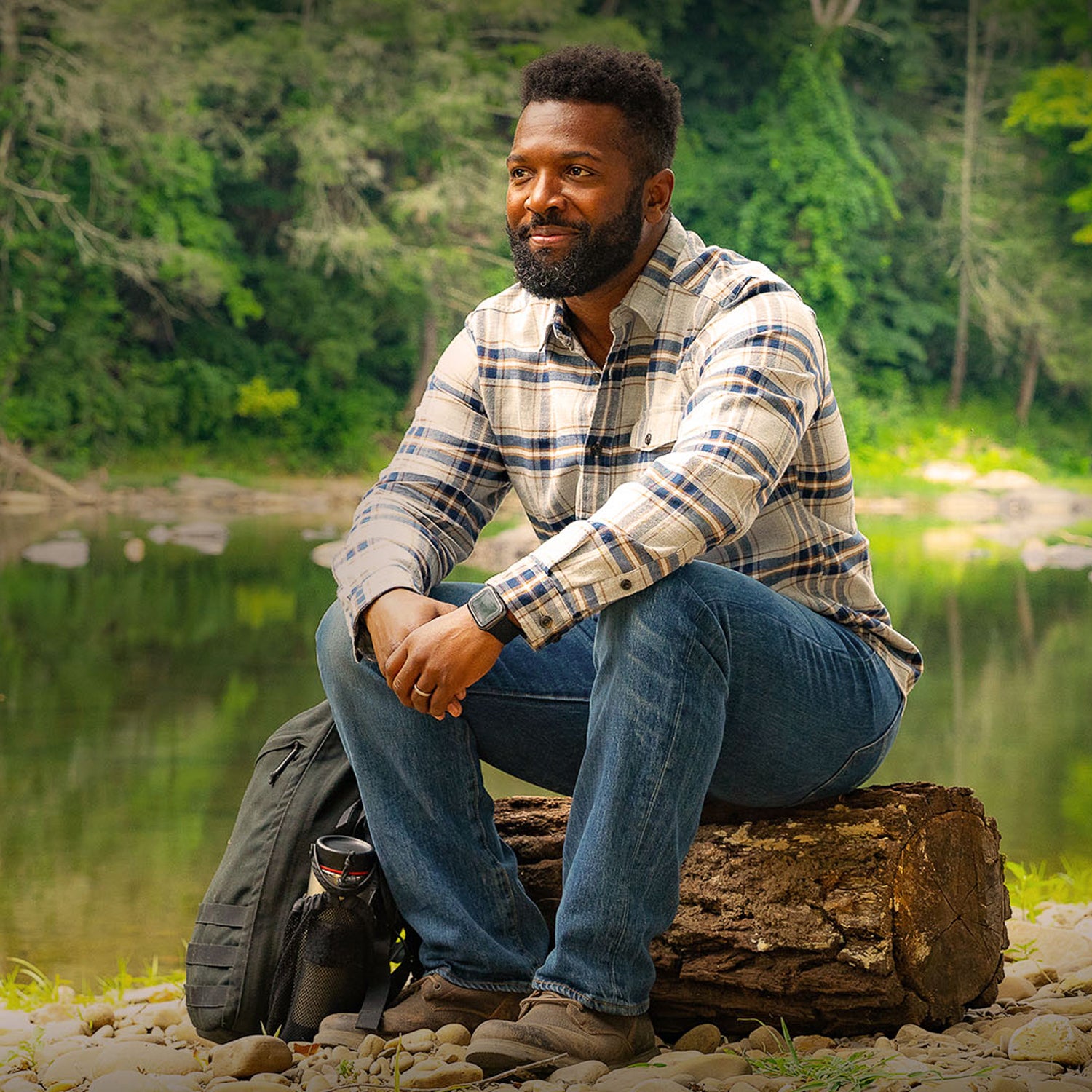“How does our relationship with the outdoors define us as individuals—and as a nation?” As a storyteller and an environmentalist, I’ve been running after this question for the better part of 20 years. As an African American, I’ve been exploring this relationship my whole life. So I was excited to hear it posed by Black writer and activist Baratunde Thurston at the beginning of the new six-part series he’s hosting . (The first episode premieres tonight, Tuesday, July 5, at 9 p.m. Eastern.) As Thurston told me during a phone interview, his aim with this show is to create “a more holistic version of the story of being American.” He does this by traveling to diverse landscapes across the U.S., from West Virginia to Los Angeles, and talking to the people he meets there. The show allows viewers to become armchair travelers who can see and learn about the history and complexity of our outdoor spaces without ever having to pack a bag. “I feel small and I feel lucky to be a part of all this,” Thurston says at the end of the first episode, looking out at Death Valley’s vast desert from a lawn chair in front of his RV. “No doubt,” I say while watching, nodding vigorously in agreement.
America Outdoors is one of a growing number of travel shows attempting to shift how we talk about nature and our relationship to it, and to change who we trust to tell us those stories. Refreshingly, it allows Thurston to color (pun intended) the conversation with commentary about race, gender, ablelism, and other forms of difference, to remind us that there is no singular experience of nature that takes precedence. In the first episode, while visiting Death Valley, he meets Mosi Smith, an African-American ultrarunner. “The outdoors is supposed to be a place where we all belong,” Thurston says. “But that’s not always the case for many of us.” Thurston and Smith discuss Ahmaud Arbery, the 25-year-old Black man who was shot to death in 2020 while jogging in Glynn County, Georgia. “I can’t go out the door without thinking about that,” says Smith, who’s run the 135-mile Badwater Ultramarathon multiple times. But, he says, “I refuse to let outside things dictate my joy.” In one short scene between two Black men, the show highlights our country’s legacy of racism and how it’s experienced today, including in the outdoors.
You’ll need to put on your metaphorical hiking shoes because Mr. Thurston covers a lot of ground, geographically and topically, in this series. He slogs through the Great Dismal Swamp in southeastern Virginia with archeologist Dan Sayers and rides a kayak in the New River Gorge National Park with Eric Thompson, a parapelegic rafting guide who talks passionately about accessibility and adaptation in the outdoors. While visiting Appalachia, Thurston meets Jennifer Pharr Davis, who has hiked the entire Appalachian Trail three times. They talk about how she has been slighted and underestimated because of her gender. Initially, she hoped to set the record for the fastest woman ever to hike the AT, not even thinking it possible for her to break the male record. “I told myself that what I do won’t be as good as what the guys did,” she says. Her greatest challenge, it turned out, was her own limited thinking. In 2011, on her third AT hike, she broke the trail’s overall supported speed record, becoming the fastest person of any gender to complete it. (Her record has since been broken.)
Thanks to Thurston, the show does an exemplary job of elevating the stories of others on their own terms, not simply as an extractive exercise or an attempt at virtue-signaling. This is not an easy task, but Thurston, who is an accomplished writer, pundit, and comedian, is no stranger to engaging diverse audiences. He leans into his role as transmitter and translator with confidence and joy, bringing a degree of earnestness and respect to every encounter. This is on display when he meets up with a Timbisha Shoshone elder and activist in Death Valley and an Anishinaabe couple in northern Minnesota. At a time when some have questioned the authenticity of land acknowledgements on social media and elsewhere, their stories felt genuinely presented. The show emphasizes the importance of engaging with each other, listening, and being curious.
Thurston’s visit to Los Angeles may be my favorite episode. In L.A., Thurston acknowledges the challenge of seeing urban spaces as part of nature, while also addressing how the city’s racial and economic disparities are reflected in its greenery. He speaks with Black surfers from , an organization that offers free surf lessons to people of color, and then visits a community garden where he interviews Florence Nishita, a Japanese-American woman who speaks about her love for gardening and shares the scars her family carries because of their experience in Japanese internment camps during World War II.

His journey continues when he meets with previously incarcerated men and women of various ethnic and racial backgrounds who have become firefighters. Thurston talks about the practice of using incarcerated people to fight the wildfires that ravage California every year, but this story isn’t about the prison industrial complex. It’s about the passion these men and women feel for firefighting, and their willingness to risk their lives. It’s hard to ignore, though, that these firefighters are up against a system that resists giving people a second chance once they’ve been in jail. The show seems to say that redemption is real and possible. But I wonder if we are ready to make the necessary changes that redemption requires?
It’s hard to talk about these kinds of sensitive subjects without potentially alienating people. I can attest to this—in my own work, I have engaged with hundreds of organizations, institutions, and community groups who invite me to talk about our complex and complicated relationships with nature in the U.S. How do you bring up hard truths in a way that is discerning but not judgmental? That doesn’t shy away from what is difficult, but is generous in meeting people where they are, so that they can make that leap to “get outside their comfort zones,” as Thurston suggests, and ultimately change and adapt?
America Outdoors doesn’t always go as deep as it could when exploring issues on the show like climate change, racism, and economic disparity. Whether talking about xenophobia in Idaho or the loss of jobs in West Virginia, the conversations sometimes only scratch the surface of the hurt, fear, pain, and resistance to change that so many of us contend with. I also wanted to know more about what Thurston was actually feeling during those conversations. When I asked him about this, he revealed that his personal journey did not always make the final cut. Thurston told me that his most significant moment came during a visit to the Great Dismal Swamp, which was a refuge for fugitive enslaved people for more than 200 years. While contemplating this place and its history, he says, he “fell down to his knees and just wept…out of a sense of awe.”
Skimming over those moments was a missed opportunity, perhaps, because for an audience to change their minds, they must be willing to feel uncomfortable while addressing the hard questions. I understand that America Outdoors is a television show, and part of its mandate is to entertain. Yet I can’t help thinking that true change comes when we feel something. Only then can we address the inherent biases that we all possess.
But all journeys have a beginning, and America Outdoors gives its viewers a free ticket to take that first step. “I have tasted transformation,” Thurston says. “I want that for more people.” I believe him. He and his team have created a new breed of nature show, one that highlights, as Thurston puts it, that “we’re all connected.” And it does so with honesty and a commitment to telling a good story.
As it happens, this show is not the only one venturing into new territory: at least one other new series about the outdoors with a nonwhite host is coming our way: , featuring Christian Cooper, who was infamously accosted in Central Park by a white dog owner named Amy Cooper. But we still have work to do: while both series have Black hosts, both are men. How might the viewpoint of these series be further expanded and transformed by challenging who has authority to instill public trust and tell a good story? Thurston said it best: we need “to get light shining on the same lessons from different angles” in order to illuminate and liberate us all.


